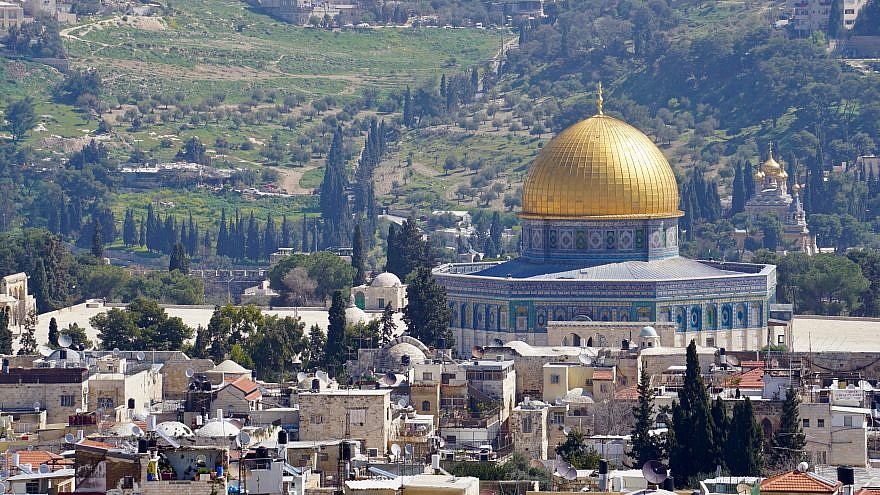The Jordanian House of Representatives, the lower house of the Jordanian parliament, held an urgent special session on April 19 to discuss the situation in Jerusalem. A number of recommendations emerged from the session, including to expel the Israeli ambassador from Amman, recall the Jordanian ambassador from Israel, halt all forms of normalization with Israel and reexamine the 1994 Jordan-Israel Peace Treaty.
House speaker Atef al-Tarawneh, who led the session, called on the government to clarify to Israel that the peace treaty was in danger and also called for an Arab Interparliamentary Union conference in Jordan to discuss Israeli violations of the status quo.
Amid the escalated tension between the two countries, senior Jordanian journalist Fahed al-Khitan, who is close to the Jordanian establishment, wrote an article urging the government to reject calls to cancel the peace treaty, arguing that doing so could have unintended negative repercussions.
He pointed out that cancelling the treaty would also cancel recognition of Jordan’s custodianship of the Muslim holy sites in Jerusalem, which are part of the treaty. He also noted that Jordan is almost complete isolated with regard to Jerusalem, citing Arab silence and U.S. support for Israel on the issue. While Jordanians may see Israel as an enemy and an occupier, he said, “diplomacy has its own rules” and “those who set Jordanian policy must proceed with a maximum of caution.”
The following are translated excerpts from Khitan’s article:
“Jordan is utilizing every tool at its disposal, given the current Arab and international diplomatic and political reality, to curb the Zionist aggression in Jerusalem and Al-Aqsa. The Arab arena is not hidden from the eyes of the Jordanian, Palestinian and Arab citizens, and [they know that], with the exception of the unwavering Jordanian positions on what is happening in Jerusalem, no Arab regime is saying anything about it, not even out of diplomatic politeness.
“On the international level, the European Union is the only force Jordan can coordinate with and count on to support legitimate international resolutions. We were used to [seeing] the U.S. administration restrain the Israeli escalation whenever it crossed the line, but now [this administration] is on the other side of the fence, defending the aggressive policy of [Israeli Prime Minister Benjamin] Netanyahu’s government and actually outdoing the Israeli right in its hostile policy towards the Palestinians.
“For these reasons, the decision-makers and influential circles in Jordan must proceed with a maximum of caution in every step they take in the complex relations with Israel. Jordan always stresses that Jerusalem, the holy sites and the principles of a just solution to the Palestinian problem—all these and only these—are red lines that must not be crossed.
“[Jordan] never said that the peace treaty with Israel is also on this list [of red lines] … [but] it should be noted that … the Hashemite custodianship over the Islamic and Christian holy places in Jerusalem, and the Jordanian role in administering them, are legally anchored in a clause of [this] peace treaty. So if the treaty is canceled, this clause—as well as the international positions [that recognize Jordan’s role in Jerusalem], which are based on it—will become null and void.
“That would not be a problem if the Arab and Islamic countries had some other way to protect the holy sites from Judiazation and preserve the status quo until the establishment of an independent Palestinian state that would receive sovereignty over these holy sites. [But] so far, no Arab or Islamic country has presented an alternative to the Jordanian role, which is why all of them support the status quo.
“In previous crises over Al-Aqsa and the other holy sites in Jerusalem, which have been many, Jordan always succeeded, by means of its political and diplomatic tools and its network of international relations, in resolving the issues and restoring the status quo, and in stopping the aggression against the holy sites …
“Jordan has cried itself hoarse urging the Arabs to help the Palestinians in every possible way in order to realize [the goals of] giving them control over their land and supporting their steadfastness, for that is the tested method of opposing the Zionist [policy of] Judaization and settlement-building. The problem of the [Muslim] nation does not lie in a lack of available options [for action regarding Jerusalem], but rather in [their] ability to implement these options. Amid this impotence, don’t make Jordan the [only] option [for defending Al-Aqsa] and the [only] alternative [available to] the nation.”


























